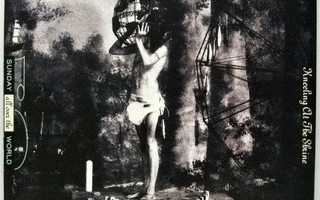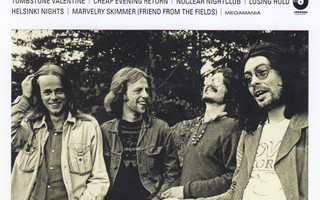Neil Young LP Time Fades Away original mukana juliste
Kuvaus
Neil Young vinyyli LP Time Fades Away (Reprise MS 2151, USA 1973), originaali USA-painos, mukana sanajuliste. Kannessa lievää hyllykulumaa, vinyyli erittäin hyväkuntoinen EX+, tarkistettu kirkkaassa kohdevalossa ja aikoinaan kuunnellen. Katso kuvaustani.
Katso myös muita kohteitani, yhdistän voittavat kohteet, säästät postikuluissa. Samoilla 8 euron kuluilla niin paljon kirjoja, levyjä, videoita, VHS:iä ym. mitä minulla myynnissä (ellei kohteessa muuta ole mainittu). Yli 100 euron toimitukset kokonaan kuluitta..
Time Fades Away is a 1973 live album by Neil Young, consisting of previously unreleased material. It was Young's first live album, and was recorded with The Stray Gators on the tour following 1972's highly successful Harvest and has not been reissued on CD due to Young's dissatisfaction with that particular series of concerts. Although Time Fades Away received much critical praise, has been widely pirated, and is highly sought after by fans, there are no current plans to reissue the album except as part of the Official Release Series Discs 5-8 Vinyl Box Set for Record Store Day 2014 and the proposed second volume of the Archives box set.
History
Though "Love In Mind" dates from a 1971 solo tour (on the January 30 date of the tour, from which "The Needle and the Damage Done" on Harvest was sourced), all other songs on the album were from recordings made during a 62-date tour in early 1973 that featured an acoustic set with Young followed by an electric set with backing band the Stray Gators. Longtime collaborator and former Crazy Horse guitarist Danny Whitten had been set to join the Gators as a second guitarist but was sent home after it became evident that he was in no condition to embark on a rigorous tour. He died shortly after from a heroin overdose. This motif of death and gloom recurred throughout the period, culminating in Tonight's the Night.
The tour came on the heels of the success of the primarily acoustic, country-tinged Harvest. Audiences did not always react positively to the new songs premiered; neither were they fond of the Gators' raucous and heavily electrified live sound. Having been introduced to tequila (which he would retrospectively characterize as a potentiator of "interesting" experiences beyond the purview of other alcoholic beverages) by bassist Tim Drummond, Young grew increasingly aloof and mentally unstable as the tour progressed, lambasting band members' performances following concerts, scheduling soundchecks that were often cancelled on short notice, and once proclaiming to longtime fan Ken Viola in Boston that "They're gonna win the war!" (a likely allusion to the imminent ratification of the Paris Peace Accords) before storming off in drunken insensateness. Such behavior frustrated drummer Kenneth Buttrey (who had initially refused to tour unless he received $100,000 in compensation, a salary extended to the rest of the band following protests from pianist Jack Nitzsche) to the point where he left the group two-thirds of the way through; he was immediately replaced by former Turtles/CSNY/Jefferson Airplane percussionist Johnny Barbata, who plays on all of the recordings on the album.
Other band members performed erratically: according to producer Elliot Mazer, Nitzsche would often spew obscenities into his switched-off vocal microphone, while pedal steel/dobro player Ben Keith was so inebriated at one soundcheck that he could not recall the key of "Don't Be Denied", a key song in the tour's core setlist. Following the loss of a pickup on his signature Old Black (a heavily modified Gibson Les Paul), Young switched to a Gibson Flying V in homage to Lonnie Mack, one of the model's first promulgators; according to Young, the guitar "wouldn't stay in tune" and lacked the timbral mutability of the former instrument. Accordingly, McDonough has castigated Young's instrumental performances as "the worst guitar playing of his career".
Alcohol abuse and strained singing would lead Young to develop a throat infection in the final days of the tour. Called in to supplement the harmonies and add some extra guitar were David Crosby and Graham Nash. Clashes continued, with Nitzsche complaining that he couldn't hear himself playing because Crosby's 12-string electric guitar overpowered the sound mix. After ninety days, the tour ended in Salt Lake City.
Recording[edit]
Time Fades Away was recorded directly from the soundboard to 16-track using the Quad-8 CompuMix, the unreliable first digital mixing soundboard—against the wishes of producer David Briggs, who referred to it as the "Compufuck" but was forced to yield to the desires of Young. This resulted in a murky-sounding release
There were no 2 track masters ever made of this record. The master discs were cut directly from the 16 track masters through the Compumix system. A mix was recorded to a second 16 track machine--we had 2 that would run perfectly together--to feed the variable pitch system of the lathe--but was discarded when we were through. I was the mastering engineer who cut the masters.
Phil Brown
Because no two-track stereo master tape was ever made as would commonly be done, the album cannot be remastered in a traditional manner. If any new release was to be attempted, a new mix would need to be made from the original multitrack tapes.
Release
Time Fades Away was released on October 15, 1973. The album reached #22 on the Billboard Charts, and quickly achieved gold status, selling over 1 million copies in both the US and UK. It was issued on vinyl, cassette and 8 track.
The album's title track was briefly released as a single, with the B-side of "Last Trip To Tulsa", a live version of the song also taken from the Time Fades Away tour and unavailable anywhere else.
Response
Young's response
Neil Young commented on Time Fades Away in the original, unreleased liner notes for his 1977 triple-album compilation Decade:
Time Fades Away. No songs from this album are included here. It was recorded on my biggest tour ever, 65 shows in 90 days. Money hassles among everyone concerned ruined this tour and record for me but I released it anyway so you folks could see what could happen if you lose it for a while. I was becoming more interested in an audio verite approach than satisfying the public demands for a repetition of Harvest.
In 1987, Young told an interviewer that Time Fades Away was "the worst record I ever made - but as a documentary of what was happening to me, it was a great record. I was onstage and I was playing all these songs that nobody had heard before, recording them, and I didn't have the right band. It was just an uncomfortable tour. I felt like a product, and I had this band of all-star musicians that couldn't even look at each other."
Young has rarely played songs from Time Fades Away live, but in July 2008 performed the record's title track at a concert in Oberhausen, Germany.
Upon its release, Time Fades Away received positive reviews from Rolling Stone, The New York Times, and Robert Christgau of The Village Voice. In more recent years, it has been rated highly by AllMusic,sputnikmusic, and Blurt Online.
R.E.M. has cited Time Fades Away as a source of inspiration for New Adventures in Hi-Fi.
On December 31, 2013, Widespread Panic played the following three songs from Time Fades Away: "Journey Through The Past", "Don't Be Denied", and "Time Fades Away" at a concert in Atlanta, GA.
Aborted compact disc reissue and Time Fades Away II
Along with the soundtrack to Journey Through the Past, Time Fades Away remains the only officially released Neil Young album unavailable on compact disc. Young has often cited his unfavorable memories of the tour as the main reason that the record has not been reissued. There is a movement among Young's fans to release the album.
In the mid-1990s, plans were made to release the album on CD using the HDCD encoding; several test pressings were made, and a street date of November 7, 1995 was announced. However, the CD release was shelved for unknown reasons. In early 2007, Young's management reiterated that there were no plans to release the album on CD. Pristine vinyl copies are still available in used stores and on eBay, often with the fold-out liner notes still intact; some CDs from the 1995 test pressings exist, and copies of these CDs are circulated as bootlegs. Additionally, some fans have made CDs from the more readily available vinyl copies.
In October 2009, Young told Guitar World that a disc titled Time Fades Away II will be included in the second volume of the Archives box set series, noting: "It's interesting because [Time Fades Away II] has a different drummer than what was on that album. Kenny Buttrey was in there for the first half, and Johnny Barbata came in for the second. It's a completely different thing, with completely different songs."
Side one
1. "Time Fades Away" (recorded at The Myriad in Oklahoma City, March 1, 1973) 5:36
2. "Journey thru the Past" (recorded at the Public Hall in Cleveland, February 11, 1973) 3:19
3. "Yonder Stands the Sinner" (recorded at the Seattle Center Coliseum in Seattle, March 17, 1973) 3:17
4. "L.A." (recorded at The Myriad in Oklahoma City, March 1, 1973) 3:11
5. "Love in Mind" (recorded in Royce Hall at the University of California, Los Angeles, January 30, 1971) 1:58
Side two
1. "Don't Be Denied" (recorded at The Coliseum in Phoenix, March 28, 1973) 5:16
2. "The Bridge" (recorded at the Memorial Auditorium in Sacramento, April 1, 1973) 3:05
3. "Last Dance" (recorded at the Sports Arena in San Diego, March 29, 1973) 8:47
Personnel
Neil Young — vocals, guitar, harmonica, bass
Ben Keith — pedal steel, vocal, slide guitar
Jack Nitzsche — piano, vocal
David Crosby — guitar, vocal
Graham Nash — guitar, vocal
Tim Drummond — bass
Johnny Barbata — drums
Myyjä
Osta heti
Lisätiedot
Maksaminen ja toimitus
Kysymykset
Kirjaudu sisään tai luo uusi tunnus.

